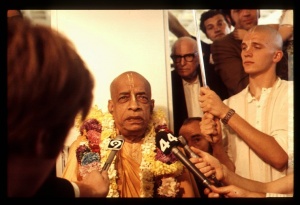SB 6.19.17: Difference between revisions
m (1 revision(s)) |
(Vanibot #0054 edit - transform synonyms into clickable links, which search similar occurrences) |
||
| (One intermediate revision by one other user not shown) | |||
| Line 1: | Line 1: | ||
{{info | {{info | ||
|speaker= | |speaker=Śukadeva Gosvāmī | ||
|listener=King | |listener=King Parīkṣit | ||
}} | }} | ||
[[Category:Srimad-Bhagavatam - Canto 06 Chapter 19]] | |||
[[Category:Bhagavatam Verses Spoken by Sukadeva Gosvami - Vanisource|061917]] | |||
<div style="float:left">'''[[Srimad-Bhagavatam]] - [[SB 6|Sixth Canto]] - [[SB 6.19: Performing the Pumsavana Ritualistic Ceremony|Chapter 19: Performing the Puḿsavana Ritualistic Ceremony]]'''</div> | |||
<div style="float:right">[[File:Go-previous.png|link=SB 6.19.16]] '''[[SB 6.19.16]] - [[SB 6.19.18]]''' [[File:Go-next.png|link=SB 6.19.18]]</div> | |||
{{RandomImage}} | |||
==== TEXT 17 ==== | ==== TEXT 17 ==== | ||
<div class="verse"> | |||
<div | :patiṁ ca parayā bhaktyā | ||
patiṁ ca parayā bhaktyā | :mahāpuruṣa-cetasā | ||
mahāpuruṣa-cetasā | :priyais tais tair upanamet | ||
priyais tais tair upanamet | :prema-śīlaḥ svayaṁ patiḥ | ||
prema-śīlaḥ svayaṁ patiḥ | :bibhṛyāt sarva-karmāṇi | ||
bibhṛyāt sarva-karmāṇi | :patnyā uccāvacāni ca | ||
patnyā uccāvacāni ca | |||
</div> | </div> | ||
| Line 19: | Line 24: | ||
==== SYNONYMS ==== | ==== SYNONYMS ==== | ||
<div class="synonyms"> | |||
<div | ''[//vanipedia.org/wiki/Special:VaniSearch?s=patim&tab=syno_o&ds=1 patim]'' — the husband; ''[//vanipedia.org/wiki/Special:VaniSearch?s=ca&tab=syno_o&ds=1 ca]'' — and; ''[//vanipedia.org/wiki/Special:VaniSearch?s=parayā&tab=syno_o&ds=1 parayā]'' — supreme; ''[//vanipedia.org/wiki/Special:VaniSearch?s=bhaktyā&tab=syno_o&ds=1 bhaktyā]'' — with devotion; ''[//vanipedia.org/wiki/Special:VaniSearch?s=mahā&tab=syno_o&ds=1 mahā]-[//vanipedia.org/wiki/Special:VaniSearch?s=puruṣa&tab=syno_o&ds=1 puruṣa]-[//vanipedia.org/wiki/Special:VaniSearch?s=cetasā&tab=syno_o&ds=1 cetasā]'' — accepting as the Supreme Person; ''[//vanipedia.org/wiki/Special:VaniSearch?s=priyaiḥ&tab=syno_o&ds=1 priyaiḥ]'' — dear; ''[//vanipedia.org/wiki/Special:VaniSearch?s=taiḥ&tab=syno_o&ds=1 taiḥ] [//vanipedia.org/wiki/Special:VaniSearch?s=taiḥ&tab=syno_o&ds=1 taiḥ]'' — by those (offerings); ''[//vanipedia.org/wiki/Special:VaniSearch?s=upanamet&tab=syno_o&ds=1 upanamet]'' — should worship; ''[//vanipedia.org/wiki/Special:VaniSearch?s=prema&tab=syno_o&ds=1 prema]-[//vanipedia.org/wiki/Special:VaniSearch?s=śīlaḥ&tab=syno_o&ds=1 śīlaḥ]'' — being affectionate; ''[//vanipedia.org/wiki/Special:VaniSearch?s=svayam&tab=syno_o&ds=1 svayam]'' — himself; ''[//vanipedia.org/wiki/Special:VaniSearch?s=patiḥ&tab=syno_o&ds=1 patiḥ]'' — the husband; ''[//vanipedia.org/wiki/Special:VaniSearch?s=bibhṛyāt&tab=syno_o&ds=1 bibhṛyāt]'' — should execute; ''[//vanipedia.org/wiki/Special:VaniSearch?s=sarva&tab=syno_o&ds=1 sarva]-[//vanipedia.org/wiki/Special:VaniSearch?s=karmāṇi&tab=syno_o&ds=1 karmāṇi]'' — all activities; ''[//vanipedia.org/wiki/Special:VaniSearch?s=patnyāḥ&tab=syno_o&ds=1 patnyāḥ]'' — of the wife; ''[//vanipedia.org/wiki/Special:VaniSearch?s=ucca&tab=syno_o&ds=1 ucca]-[//vanipedia.org/wiki/Special:VaniSearch?s=avacāni&tab=syno_o&ds=1 avacāni]'' — high and low; ''[//vanipedia.org/wiki/Special:VaniSearch?s=ca&tab=syno_o&ds=1 ca]'' — also. | ||
</div> | </div> | ||
| Line 27: | Line 31: | ||
==== TRANSLATION ==== | ==== TRANSLATION ==== | ||
<div class="translation"> | |||
<div | |||
Accepting her husband as the representative of the Supreme Person, a wife should worship him with unalloyed devotion by offering him prasāda. The husband, being very pleased with his wife, should engage himself in the affairs of his family. | Accepting her husband as the representative of the Supreme Person, a wife should worship him with unalloyed devotion by offering him prasāda. The husband, being very pleased with his wife, should engage himself in the affairs of his family. | ||
</div> | </div> | ||
| Line 35: | Line 38: | ||
==== PURPORT ==== | ==== PURPORT ==== | ||
<div class="purport"> | |||
<div | |||
The family relationship of husband and wife should be established spiritually according to the process mentioned above. | The family relationship of husband and wife should be established spiritually according to the process mentioned above. | ||
</div> | </div> | ||
__NOTOC__ | |||
<div style="float:right; clear:both;">[[File:Go-previous.png|link=SB 6.19.16]] '''[[SB 6.19.16]] - [[SB 6.19.18]]''' [[File:Go-next.png|link=SB 6.19.18]]</div> | |||
__NOTOC__ | |||
__NOEDITSECTION__ | |||
Latest revision as of 22:37, 18 February 2024

A.C. Bhaktivedanta Swami Prabhupada
TEXT 17
- patiṁ ca parayā bhaktyā
- mahāpuruṣa-cetasā
- priyais tais tair upanamet
- prema-śīlaḥ svayaṁ patiḥ
- bibhṛyāt sarva-karmāṇi
- patnyā uccāvacāni ca
SYNONYMS
patim — the husband; ca — and; parayā — supreme; bhaktyā — with devotion; mahā-puruṣa-cetasā — accepting as the Supreme Person; priyaiḥ — dear; taiḥ taiḥ — by those (offerings); upanamet — should worship; prema-śīlaḥ — being affectionate; svayam — himself; patiḥ — the husband; bibhṛyāt — should execute; sarva-karmāṇi — all activities; patnyāḥ — of the wife; ucca-avacāni — high and low; ca — also.
TRANSLATION
Accepting her husband as the representative of the Supreme Person, a wife should worship him with unalloyed devotion by offering him prasāda. The husband, being very pleased with his wife, should engage himself in the affairs of his family.
PURPORT
The family relationship of husband and wife should be established spiritually according to the process mentioned above.